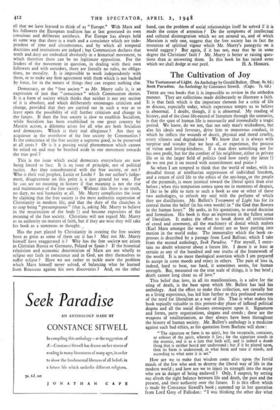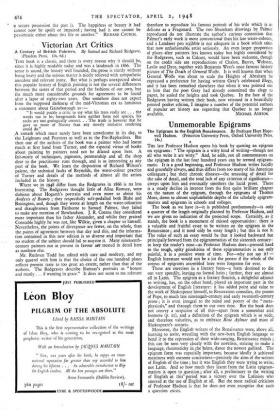The Cultivation of Joy
THESE are two books that it is impossible to review in the orthodox manner. They are collections made deliberately to illustrate a faith. It is that faith which is the important element for a critic of life to discuss, especially today, which experience tempts us to believe is abnormal. I doubt, though, if it is abnormal. My reading of history, and of the close life-record of literature through the centuries, is that •the span of human life is necessarily and irremedially a tragic period. We know, do we not, that not only man's wickedness, but also his ideals and fervours, drive him to monstrous conduct, in which he inflicts the wounds of deceit, physical and moral cruelty, every vileness and degradation ? We know that it is always with surprise and wonder that we hear. of, or experience, the process of virtue and loving-kindness. If a man does something not for his own profit, but for the comfort of his neighbour, either in private life or in the larger field of politics (and how rarely the latter !) do we not put it on record with astonishment and praise ?
So when I am tempted to think that the world of today, with its dreadful threat of totalitarian suppression of individual freedom, and a return of civil life to the ethics of the apt-heap, or the people of the pyramids, is more inimical toward the liberal spirit than ever before ; when this temptation comes upon me in moments of despair, I like to be able to turn to such a book as one or other of these two anthologies, to refresh my soul with the perfume of which they are distillations. Mr. Bullett's Testament of Light has for its central theme the belief (in his own words) in " the God that flowers in the human heart." He seeks, in his quotations, to avoid doctrine
and formalism. His book is thus an in the fullest sense of liberalism. It makes the effort to break down all restrictions of creed and ceremony, all the machinery of denial which zealots (Karl Marx amongst the worst of them) are so busy putting into motion in the world today. The immortality which the book ex- presses is described by a passage from Lord Balfour, which I take from the second anthology, Seek Paradise. "For myself, I enter- tain no doubt whatever about a future life. I deem it at least as certain as any of the hundred and one truths of the framework of the world. It is no mere theological assertion which I am prepared, lo accept in some moods and reject in others. The pain of loss indeed, hard to bear, too hard, it sometimes seems, for human strength. But, measured on the true scale of things, it is but brief ; death cannot long cheat us of love."
This belief that love, in all its manifestations, is a salve for the sting of death, is the base upon which Mr. Bullett has laid his anthology. And the effort to make this collection, not casually but as a living experience, has led him further to this profound assertion of the need for liberalism as a way of life. That is what makes his book topically valuable in this present-day phase of inflatl political dogma and all the social diseases consequent upon it. Signatures and forms, party organisations, slogans and creeds - these are the weapons of totalitarianism, as they always have been throughout the history of human society. Mr. Bullett's anthology is a medicine against such bad ethics, as his quotation from Boehme will show: " The signature or form is no spirit, but the receptacle, container, or cabinet of the spirit, wherein it lies ; for the signature stands in the essence, and is as a lute that lieth still, and is indeed a dumb thing that is neither heard nor understood ; but if it be played upon, then its form is understood, in what form and tune it stands, and according to what note it is set."
How are we to make that wisdom come alive upon the fervid minds of the few who seek to destroy the liberal way of life in the modern world ; and how are we to inject its strength into the many who are in danger of being enslaved ? Only, I suspects by setting out afresh the right balance between life and death, the past and the present, and their authority over the future. It is this effort which is made by Constance Sitwell's book ; summed up in her quotation from Lord Grey of Fallodon: "I was thinking the other day what
is secure possession the past is. The happiness or beauty it had cannot now be spoilt or impaired ; having had it one cannot be pessimistic either about this life or another." RICHARD CHURCH.































 Previous page
Previous page